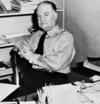- Wilson, Edmund
-
died June 12, 1972, Talcottville, N.Y.U.S. critic and essayist.He attended Princeton University and initially worked as a reporter and magazine editor. Much of his writing, in which he probed diverse subjects with scholarship and common sense in clear and precise prose, was published in The New Republic and The New Yorker. Among his influential critical works are Axel's Castle (1931), a survey of the Symbolist poets; To the Finland Station (1940), a study of the thinkers who set the stage for the Russian Revolution; and Patriotic Gore (1962), analyzing American Civil War literature. His other writings include plays, poetry, the short-story collection Memoirs of Hecate County (1946), and five volumes of posthumously published journals. He was widely regarded as the leading critic of his time.
 Edmund WilsonEncyclopædia Britannica, Inc.
Edmund WilsonEncyclopædia Britannica, Inc.* * *
▪ American criticborn May 8, 1895, Red Bank, New Jersey, U.S.died June 12, 1972, Talcottville, New YorkAmerican critic and essayist recognized as one of the leading literary journalists of his time.Educated at Princeton, Wilson moved from newspaper reporting in New York to become managing editor of Vanity Fair (1920–21), associate editor of The New Republic (1926–31), and principal book reviewer for The New Yorker (New Yorker, The) (1944–48). Wilson's first critical work, Axel's Castle (1931), was an important international survey of the Symbolist (Symbolist movement) tradition, in which he both criticized and praised the aestheticism of such writers as William Butler Yeats (Yeats, William Butler), Paul Valéry (Valéry, Paul), T.S. Eliot (Eliot, T.S.), Marcel Proust (Proust, Marcel), James Joyce (Joyce, James), and Gertrude Stein (Stein, Gertrude). During this period, Wilson was married for a time to writer Mary McCarthy (McCarthy, Mary). His next major book, To the Finland Station (1940), was a historical study of the thinkers who laid the groundwork for socialism and the Russian Revolution of 1917. Much of these two books originally appeared in the pages of The New Republic (New Republic, The). Until late in 1940 he was a contributor to that periodical, and much of his work for it was collected in Travels in Two Democracies (1936), dialogues, essays, and a short story about the Soviet Union and the United States; The Triple Thinkers (1938), which dealt with writers involved in multiple meanings; The Wound and the Bow (1941), about art and neurosis; and The Boys in the Back Room (1941), a discussion of such new American novelists as John Steinbeck (Steinbeck, John) and James M. Cain (Cain, James M.). In addition to reviewing books for The New Yorker in the 1940s, Wilson also contributed major articles to the magazine until the year of his death, including serialization of Upstate: Records and Recollections of Northern New York (1972), a collection from his journals.After World War II Wilson wrote The Scrolls from the Dead Sea (1955), for which he learned to read Hebrew; Red, Black, Blond, and Olive: Studies in Four Civilizations: Zuni, Haiti, Soviet Russia, Israel (1956); Apologies to the Iroquois (1960); Patriotic Gore (1962), an analysis of American Civil War literature; and O Canada: An American's Notes on Canadian Culture (1965). In this period five volumes of his magazine pieces were collected: Europe Without Baedeker (1947), Classics and Commercials (1950), The Shores of Light (1952), The American Earthquake (1958), and The Bit Between My Teeth (1965).In other works Wilson gave evidence of his crotchety character: A Piece of My Mind: Reflections at Sixty (1956), The Cold War and the Income Tax (1963), and The Fruits of the MLA (1968), a lengthy attack on the Modern Language Association's editions of American authors, which he felt buried their subjects in pedantry. His plays are in part collected in Five Plays (1954) and in The Duke of Palermo and Other Plays with an Open Letter to Mike Nichols (1969). His poems appear in Notebooks of Night (1942) and in Night Thoughts (1961); an early collection, Poets, Farewell, appeared in 1929. Memoirs of Hecate County (1946) is a collection of short stories that encountered censorship problems when it first appeared. Wilson edited the posthumous papers and notebooks of his college friend F. Scott Fitzgerald (Fitzgerald, F. Scott), The Crack-Up (1945), and also edited the novel The Last Tycoon (1941), which Fitzgerald had left uncompleted at his death. Wilson wrote one novel himself, I Thought of Daisy (1929). The Twenties: From Notebooks and Diaries of the Period, edited by Leon Edel, was published posthumously in 1975. His widow, Elena, edited Letters on Literature and Politics 1912–1972 (1977), and his correspondence with the novelist Vladimir Nabokov (Nabokov, Vladimir) appeared in 1979 (revised and expanded edition Dear Bunny, Dear Volodya: The Nabokov-Wilson Letters, 1940–1971, 2001).Wilson concerned himself with both literary and social themes and wrote as historian, poet, novelist, editor, and short-story writer. Unlike some of his contemporaries, such as the New Critics (New Criticism), Wilson thought that a text or topic could be best examined by placing it at the centre of intersecting ideas and contexts, whether biographical, political, social, linguistic, or philosophical. He covered a multitude of subjects, probing each with an expansiveness that was firmly rooted in scholarship and common sense, and he expressed his views in a prose style noted for its clarity and precision. His critical writings on the American novelists Ernest Hemingway (Hemingway, Ernest), John Dos Passos (Dos Passos, John), F. Scott Fitzgerald, and William Faulkner (Faulkner, William) attracted public interest to their early work and guided opinion toward their acceptance.Additional ReadingStudies of his life and works include Jeffrey Meyers, Edmund Wilson: A Biography (1995, reissued 2003); David Castronovo, Edmund Wilson (1984), and Edmund Wilson Revisited (1998); Lewis M. Dabney (ed.), Edmund Wilson: Centennial Reflections (1997); Richard Hauer Costa, Edmund Wilson, Our Neighbor from Talcottville (1980), a memoir of his last decade; George H. Douglas, Edmund Wilson's America (1983); and Janet Groth, Edmund Wilson: A Critic for Our Time (1989).* * *
Universalium. 2010.
